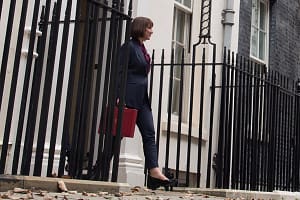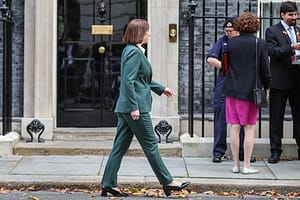A new poll by Ipsos, conducted three years on since Britain formally left the European Union, finds 45% think that Brexit is going worse than they expected, up from 28% in June 2021.
This includes two in three (66%) 2016 Remain voters saying it has gone worse (+19 since June 2021), and one in four (26%) 2016 Leave voters thinking the same (+16).
Almost one in ten (9%) say it is working out better than expected (-6), while two in five (39%) think it is meeting their expectations (-7).
Figures are similar when asked the impact Brexit has had on their daily life. Some 45% think leaving the EU has made it worse (unchanged since June 2022), against 37% stating it has made no difference (+3), and one in ten (11%) saying it has bettered their lives (-6).
When asked what the negative outcomes of Brexit are, increased barriers to trade between the UK and EU comes out on top, mentioned by two in five (40%), up 13 percentage points since last asked in March 2021. This is followed by three in ten saying the end of freedom of movement (30%, +5), and one in four citing less international cooperation between the UK and EU (26%, +7).
On the other hand, when asked about the positive outcomes, just over one in five either mention Britain gaining control over its laws and regulations (23%, unchanged), being able to respond to the Covid-19 pandemic better (22%, +1) or Britain being able to make its own decisions generally (21%, unchanged). However, around equal to this was one in four (24%) saying there are no positive outcomes (+4).
Britain’s future relationship with the European Union
Even three years on few believe that negotiations between the UK and the EU are over. Fewer than one in five (18%) say the relationship is now mostly decided and will hardly change over the next few years (18%, +4 since June 2021).
In comparison, while nearly three in ten believe the broad outlines of a future relationship will not change much over the next few years but there remain important areas left to decide (28%, +5), over one in three opt for saying there are still many important issues to finalise which means lots more negotiations over the next few years (36%).
However, the proportion believing there are many more negotiations to come has dropped from 45% in June 2021.
The overwhelming majority, 84%, think it’s important to maintain a close relationship with the EU (+6 since June 2022), against just one in ten (10%, -6) saying the opposite. However, opinion is more divided on whether this will happen, with just fewer than half saying it’s likely that Britain and the EU will have a close relationship (47%, +2) and a similar proportion saying it’s unlikely (41%, -4). Although public opinion has grown more optimistic since September 2020 (when 39% thought likely, against 49% unlikely).
When asked which two or three areas should be top priorities for Britain’s relationship with the EU, coming out first is improving the trade agreement to make it easier to buy and sell goods and services, mentioned by nearly two in five (37%, +4 since June 2022). This is followed by three in ten prioritising working with the EU to reduce illegal immigration (29%, +7), and one in four wanting close collaboration on preventing and detecting crime and terrorism (25%, +5).
While trade is a priority for both Leave and Remain voters alike (mentioned by 40% in each camp), 2016 Leave voters are more than twice as likely to prioritise working together to reduce illegal immigration (42% vs. 19%). Whereas 2016 Remain voters are three times as likely to cite making it easier for British citizens to study or work in the EU (23% vs. 7%).
Kelly Beaver MBE, CEO of Ipsos in the UK and Ireland said, “Three years on, and against the backdrop of recent political and economic uncertainty, the public are pessimistic about the direction of the country, and doubts about Brexit are part of that.
“Britons have noticed that further negotiations may be needed, and whether they be a Brexiteer and Remainer, they want an improvement to our current trade agreement to make it easier to buy and sell with the EU.
“However, underlying differences between the rival camps still exist with Leave voters far more concerned about illegal immigration and Remain voters about the loss of freedom of movement.”






Leave a Comment